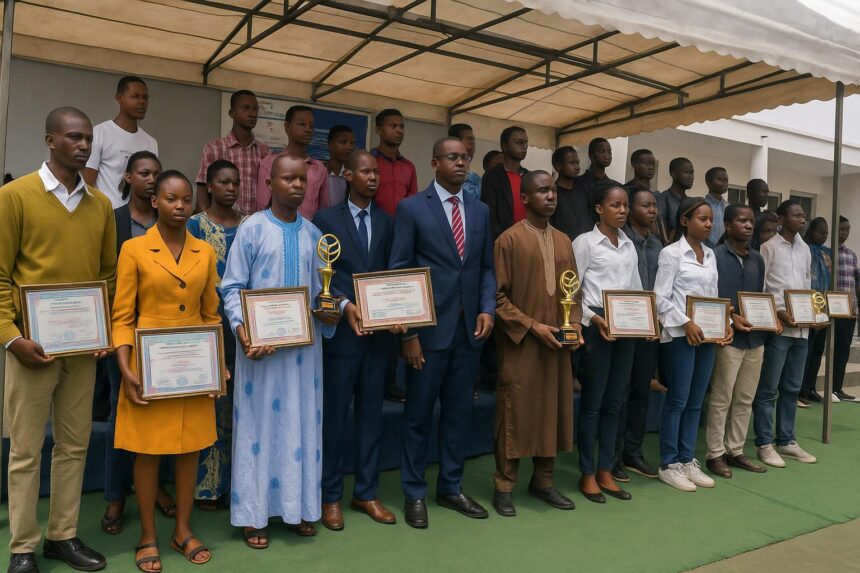Celebration of Words in Brazzaville
Lights, cameras and well-thumbed books filled the auditorium of downtown Brazzaville on 13 September as the fifth Plum’Art-Z awards ceremony unfolded before pupils, students and established authors. The evening, dedicated to the living vitality of Congolese letters, blended performance and praise without losing its friendly, almost family atmosphere.
Founded by local cultural advocate Ulrich Bakoumissa Ngouani, Plum’Art-Z seeks to highlight writers while they are still active. “We want to say thank you while the ink is still fresh,” he explained, drawing long applause from the packed rows of aspiring novelists and poets around him.
Grand Prizes Across Eight Genres
This year’s jury, chaired by noted francophone-literature critic Dr Rosin Loemba, delivered eight Grand Prizes that cover the backbone of any bookshelf: essay, novel, poetry, short story, tale, theatre, criticism and reading performance.
The 2024 laureates are Noël Nkodia Ramatha for criticism, Omer Massem for poetry, Émile Gankama for essay, Jean-Rodrigue Ngakosso for novel, Emmanuel Eta-Onka for short story, Malachie Cyrille Ngouloubi for tale, Yvon Wilfrid Lewa-Let Mandah for theatre and Jacques Nkéoua Oumba as best reader of texts. Each winner received a diploma noting “the influence of their work on French-language Congolese literature”.
How the Jury Worked
Dr Loemba told the audience that the panel reviewed manuscripts, previously published books and live readings for three months before narrowing down a shortlist of three writers per genre. In the final round, clarity of style, cultural resonance and commitment to truth were the decisive criteria, he said.
“We favoured voices capable of touching the heart of a bus commuter as much as a university scholar,” the critic added, stressing that accessibility remains key to growing the national readership.
A Stage Alive with Poetry and Prose
Between prize announcements, actors recited stanzas from Massem’s award-winning collection, while second-year literature students dramatised excerpts of Ngakosso’s latest novel. The rhythmic bongos that accompanied the readings gave the texts a local colour that students later described as “electrifying”.
Claudia Christelle Eta Likibi stepped forward to accept the short-story prize on behalf of her father, Emmanuel Eta-Onka, who is currently working abroad. Fighting back emotion, she said the trophy “will travel straight to his writing desk”.
Round-Table: Telling One’s Own Story
A highlight of the evening was a panel titled “What if every writer told their own story?”. Moderated by journalist Mireille Akouala, the discussion invited laureates to retrace the sparks that ignited their careers.
Several underlined the importance of reading circles in Brazzaville’s high schools. Others recalled community libraries founded by neighbourhood associations that enabled them to meet elders and borrow out-of-print Congolese classics. The common thread was humility. “Success is a station, not a destination,” Gankama quipped, to nods all around.
Inspiring the Next Generation
Rows of uniformed pupils scribbled notes as speakers urged them to pen their own stories. Plum’Art-Z partnered with local schools to distribute a booklet summarising each winning work, hoping to seed reading clubs across the capital and beyond.
Teacher-librarian Lucie Mouanda believes the impact will be immediate. “When learners see a fellow Congolese celebrated on stage, literature stops being abstract. It becomes something they, too, can shape,” she said after guiding her class back to the buses.
Honouring Writers While They Live
Bakoumissa Ngouani insists that celebrating authors during their lifetimes fosters a virtuous circle: writers feel valued, publishers gain confidence and readers discover home-grown voices. “Posthumous recognition is noble, but flowers smell better to the living,” he joked, triggering smiles from the front row.
According to the organiser, previous winners have since secured translation deals or invitations to regional festivals, proof that a local ceremony can open international doors without compromising Congolese roots.
Setting Sights on 2026
The next edition is pencilled in for 2026, giving writers twenty-four months to polish manuscripts and for Plum’Art-Z to refine its outreach. Plans include mobile reading rooms that can travel to Pointe-Noire and Ouesso, as well as a digital archive where past winners’ works will be available on low-data platforms.
“We are only at chapter five of a very long novel,” Bakoumissa Ngouani concluded, promising that the story will grow stronger with each page turned in classrooms, bookshops and living rooms across the Republic of Congo.





















